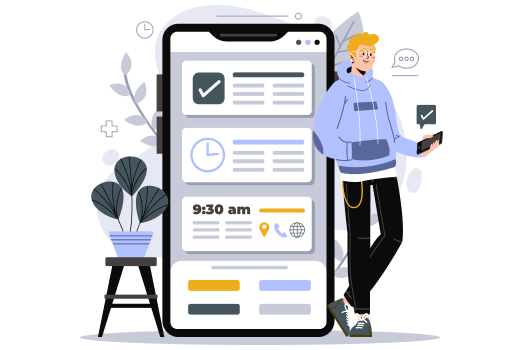The Best Mobile App Development Company in the USA
Mobile apps have become an integral part of our lives, from ordering food to booking a cab, everything is just a few taps away. With the increasing demand for mobile applications, the competition in the mobile app development industry has also increased tremendously. In such a scenario, choosing the best mobile app development company can be a daunting task. But fret not, because we have got you covered!
In this blog post, we will introduce you to the best mobile app development company in the USA that has been consistently delivering top-notch mobile app development services to its clients. So without further ado, let’s begin reading!

What Is A Mobile App?
A mobile app, short for “mobile application,” is a software application designed to run on mobile devices such as smartphones and tablets. Mobile apps are typically downloaded from app stores, such as Google Play Store and Apple App Store, and installed directly on the mobile device.
The apps can perform a variety of functions, from basic tasks such as messaging, browsing the internet, and making phone calls, to more advanced functions such as mobile banking, e-commerce, and gaming. There are also mobile apps designed for specific purposes, such as fitness tracking, language learning, and meditation.
Mobile apps are designed to provide a seamless user experience and take advantage of the unique features of mobile devices, such as touchscreens, GPS, and cameras. They are typically optimized for the screen size and resolution of the device they are running on, and often include features such as push notifications and offline access.
Ultimately, the apps have become an integral part of our daily lives, providing easy access to information and services on the go. They have transformed the way we interact with the world, making it easier and more convenient to perform tasks and stay connected with others.
What Is Mobile App Development?
Mobile app development is the process of creating software applications that run on mobile devices, such as smartphones and tablets. It involves the design, development, testing, and deployment of mobile applications for various platforms such as Android, iOS, and Windows. Mobile app development can range from building simple apps that perform basic functions to complex enterprise-level applications with advanced features and functionality.
Mobile app development typically involves a team of developers, designers, and testers who work together to create a mobile app that meets the requirements of the client and the end users. The process begins with gathering requirements and designing the user interface, followed by coding and testing the app to ensure that it works as intended. Once the app is ready, it is deployed to the app stores for users to download and use.
App development for mobile phones is a rapidly growing field, driven by the increasing use of smartphones and tablets worldwide. As businesses look to expand their reach and engage with customers on the go, the demand for mobile app development services has also increased significantly. It has evidently become an essential aspect of digital transformation, enabling businesses to improve customer engagement, increase productivity, and gain a competitive edge in the market.
What Are The Benefits Of Developing Mobile Apps?
Mobile apps have become an essential part of our daily lives, providing easy access to information and services on the go. But have you ever wondered what the benefits of developing mobile apps are? Here are some of the key advantages of mobile app development and why it has become a must-have for businesses of all sizes.
● Enhanced User Experience
Mobile apps provide a seamless and personalized user experience, allowing businesses to engage with their customers in a more meaningful way. With a mobile app, users can easily access information, products, and services, making it easier for them to interact with your business.
● Increased Brand Visibility
Mobile apps can help increase your brand’s visibility by providing a platform for customers to engage with your business on the go. With a mobile app, you can reach a wider audience and improve customer engagement, which can ultimately lead to increased brand recognition and loyalty.
● Improved Customer Engagement
Mobile apps enable businesses to interact with their customers in real-time, providing a platform for two-way communication and feedback. This can help businesses better understand their customers’ needs and preferences, and tailor their products and services accordingly.
● Enhanced Business Efficiency
Mobile apps can improve business efficiency by automating routine tasks, such as appointment scheduling, order processing, and payment processing. This can help businesses save time and resources, and focus on more strategic initiatives.
● Competitive Advantage
Developing a mobile app can provide businesses with a competitive advantage in their industry. By providing a unique and personalized user experience, businesses can differentiate themselves from their competitors and attract more customers.

What Are The Types Of Mobile Apps?
Here are some of the different types of mobile apps and their unique features.
● Native Apps
Native apps are designed specifically for a particular platform, such as Android or iOS. These apps are built using the platform’s native programming language, which allows them to take advantage of the device’s features and offer a seamless user experience.
● Hybrid Apps
These apps are a combination of native and web apps. They are built using web technologies such as HTML, CSS, and JavaScript, and then wrapped in a native container that enables them to be installed and run like a native app.
● Web Apps
The web apps are built using web technologies and run on a web browser. They are accessible through a URL and do not need to be installed on the device. Web apps are typically responsive and can adapt to different screen sizes and resolutions.
● Progressive Web Apps (PWA)
PWAs are web apps that offer a native app-like experience. They are built using web technologies and offer features such as push notifications, offline access, and home screen installation. PWAs can be accessed through a URL and do not need to be installed from an app store.
● Augmented Reality (AR) Apps
AR apps use the device’s camera and sensors to overlay digital content onto the physical world. These apps are commonly used in gaming, education, and marketing.
● Virtual Reality (VR) Apps
VR apps create a simulated environment that can be experienced through a VR headset. These apps are commonly used in gaming, education, and entertainment.
There are different types of mobile apps, each with its unique features and advantages. Understanding them can help businesses choose the right type of app for their needs.
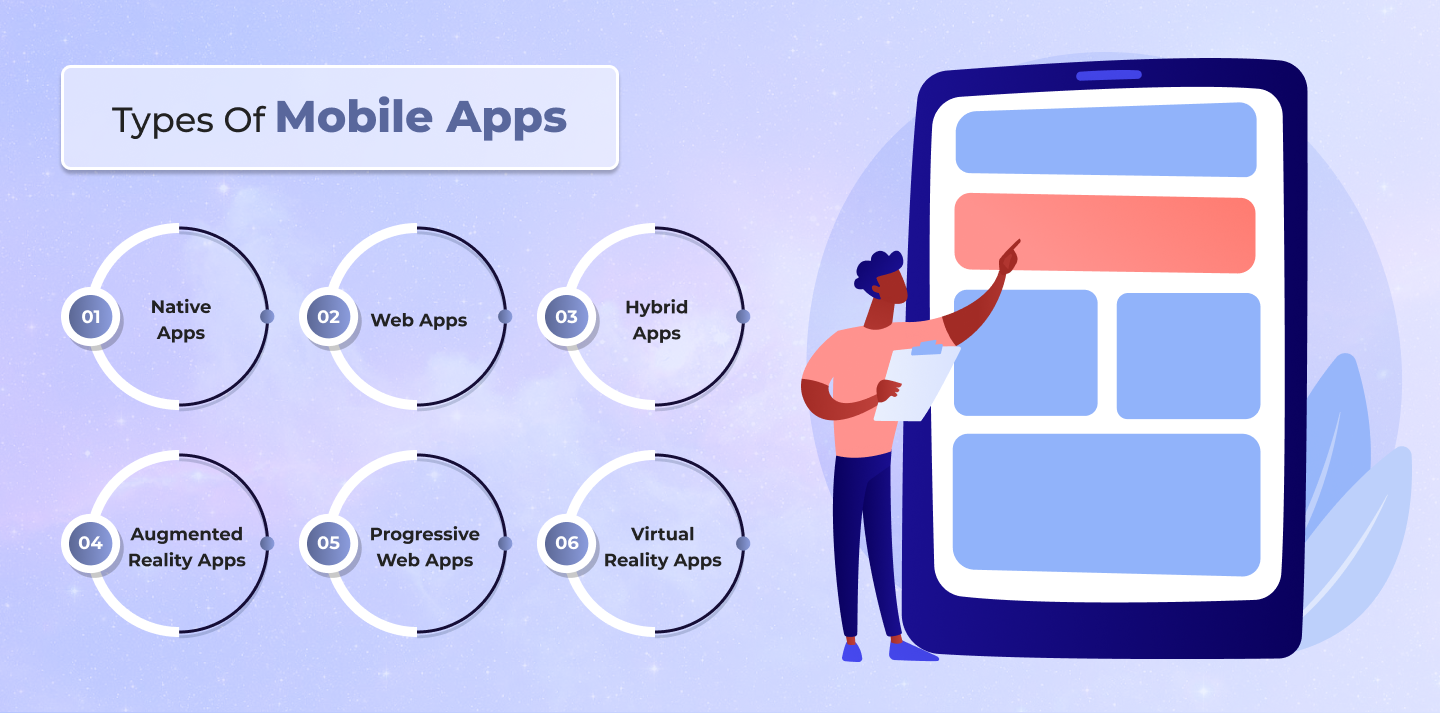
What Are The Basic Features Of Mobile Apps?
The basic features of a mobile app depend on the purpose and functionality of the app. However, there are some common features that most mobile apps have. Here are some basic features of mobile apps:
● User Interface
A mobile app should have an intuitive and user-friendly interface that allows users to navigate and access app features easily.
● Sign-Up/Log-In
Most mobile apps require users to sign up or log in to access certain features or personalize their experience.
● Push Notifications
Push notifications are a useful feature that allows the app to send alerts or reminders to the user even when the app is not open.
● Search Functionality
A search bar or search functionality helps users quickly find the content or information they are looking for within the app.
● Social Media Integration
Social media integration allows users to share content or information from the app on their social media platforms.
● In-App Purchases
In-app purchases allow users to buy products or services within the app.
● Feedback and Support
A feedback or support feature allows users to provide feedback, report issues, or contact customer support within the app.
● Offline Functionality
An app should be able to function in some capacity even when there is no internet connection available.
● Personalization
A mobile app can provide a personalized experience for users by offering features such as recommended content, customized settings, or personalized notifications.
By incorporating these features into a mobile app, businesses can provide a seamless and engaging experience for their users.
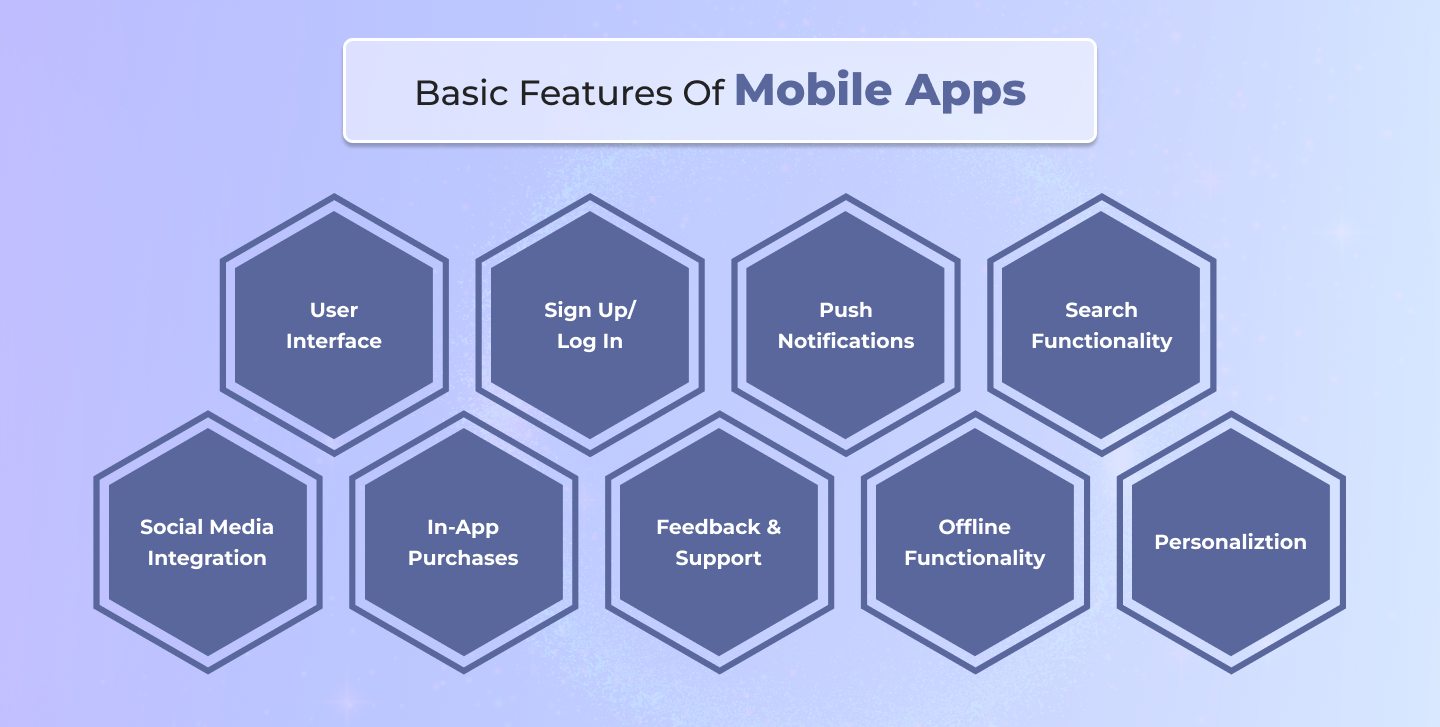
How To Choose A Type Of Mobile App For Your Business?
Choosing the right type of mobile app for your business can be a daunting task, especially if you are new to app development. However, understanding your business needs and the features of each type of mobile app can help you make an informed decision. Here are some factors to consider when choosing a type of mobile app for your business:
● User Experience
Consider the user experience you want to provide to your customers. If you want to provide a seamless, native experience with access to device features, a native app may be the best choice. If you prioritize accessibility and ease of use, a web app or progressive web app may be a good option.
● Budget and Timeline
Look into your budget and timeline for app development. Native apps tend to be more expensive and time-consuming to develop, while web apps and progressive web apps are typically more affordable and quicker to develop.
● Target Audience
Think of your target audience and their preferences. If your audience is primarily on iOS or Android devices, a native app may be the best choice. If your audience is diverse and uses different devices, a web app or progressive web app may be a better option.
● App Functionality
Consider the functionality you want to include in your app. If you need access to device features, such as the camera or sensors, a native app may be the best choice. If you want to provide a simple interface for accessing information or completing tasks, a web app or progressive web app may be a better option.
● App Security
Look into the security level you need for your app. Native apps tend to be more secure than web apps, as they are installed directly on the device and can take advantage of the device’s security features.
Finally, choosing the right type of mobile app for your business requires careful consideration of your needs, budget, timeline, target audience, app functionality, and security. By understanding the features of each type of mobile app and how they align with your business needs, you can make an informed decision that will provide the best user experience for your customers.
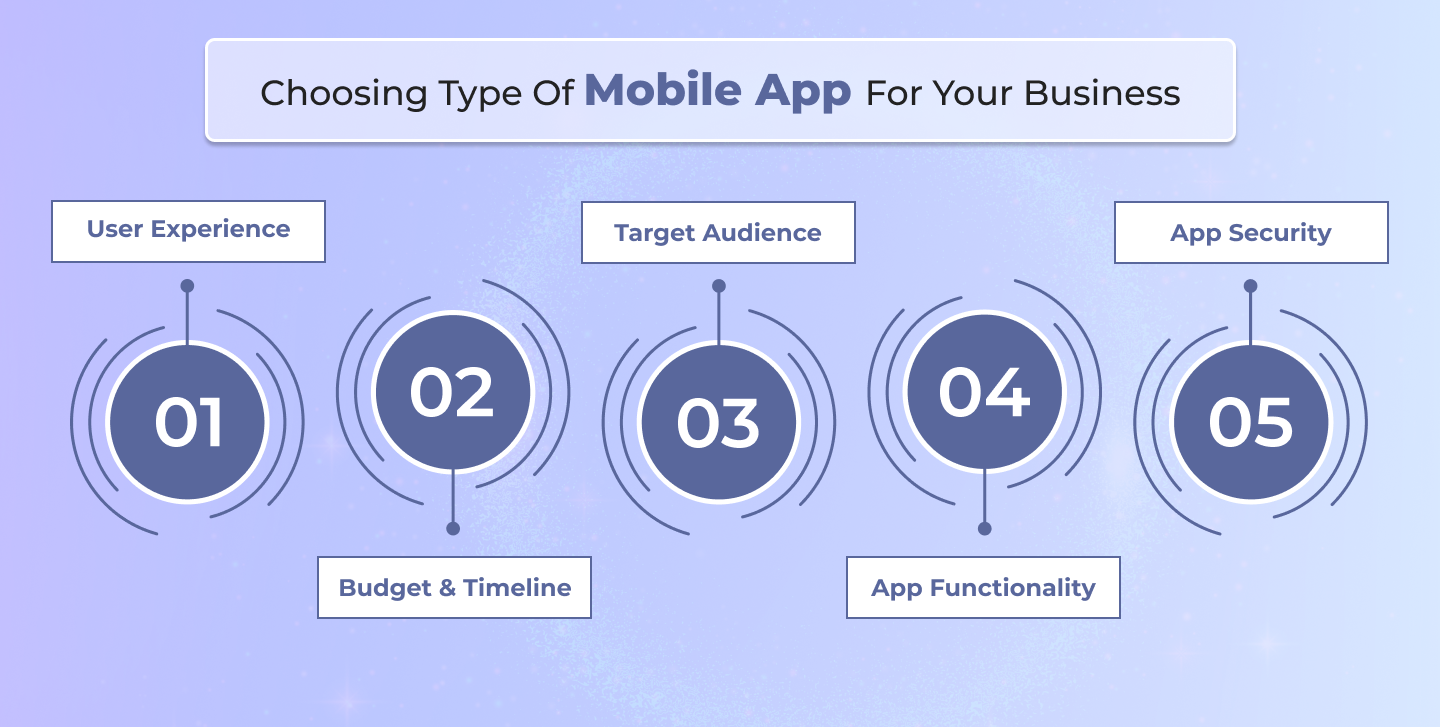
How To Choose The Best Mobile App Development Company In The USA?
Mobile apps have become a crucial component of modern businesses, providing a seamless and engaging experience to users. However, choosing the right mobile app development company in the USA can be a daunting task. With so many options available, it can be challenging to identify the best fit for your business needs. Here is how to choose the best mobile app development company in the USA.
● Experience
Experience is an essential factor when choosing a mobile app development company. You should look for companies that have extensive experience in developing mobile apps. They should have a successful track record of developing apps similar to your business idea or industry. An experienced company can provide valuable insights and guidance throughout the app development process, ensuring a successful project.
● Portfolio
A company’s portfolio is a crucial factor in assessing their quality of work and range of experience. It’s essential to review the company’s portfolio and assess their past projects’ quality, functionality, and design. Look for companies that have a diverse portfolio of successful apps. A comprehensive portfolio shows the company’s ability to handle different projects, which is a good indicator of their expertise.
● Reviews and Ratings
Reviews and ratings can provide valuable insights into a company’s reputation and customer satisfaction. Check the company’s online reviews and ratings on sites like Clutch, GoodFirms, and AppFutura. These sites provide an unbiased view of the company’s work, which can help you make an informed decision.
● Development Process
A structured development process is essential for a successful app development project. The development process should follow a structured approach that includes clear milestones, timelines, and deliverables. Look for companies that prioritize communication and transparency throughout the project. A good development process ensures that the project stays on track and delivers high-quality results.
● Team
The team working on your project is an essential factor in determining the quality of the app development. Look for companies that have a team of experienced developers, designers, and project managers. A diverse team can provide a range of perspectives and expertise, ensuring that the app development meets your business needs.
● Pricing
Pricing is a crucial factor in choosing a mobile app development company. You should compare the pricing of different companies to ensure that you are getting a fair and competitive price for the quality of work. Beware of companies that offer prices that are too good to be true, as they may compromise on the quality of work.
● Communication
Communication is critical for a successful app development project. Look for companies that prioritize clear and timely communication throughout the project. A good company should have open lines of communication, regular progress reports, and the ability to respond to your queries promptly.
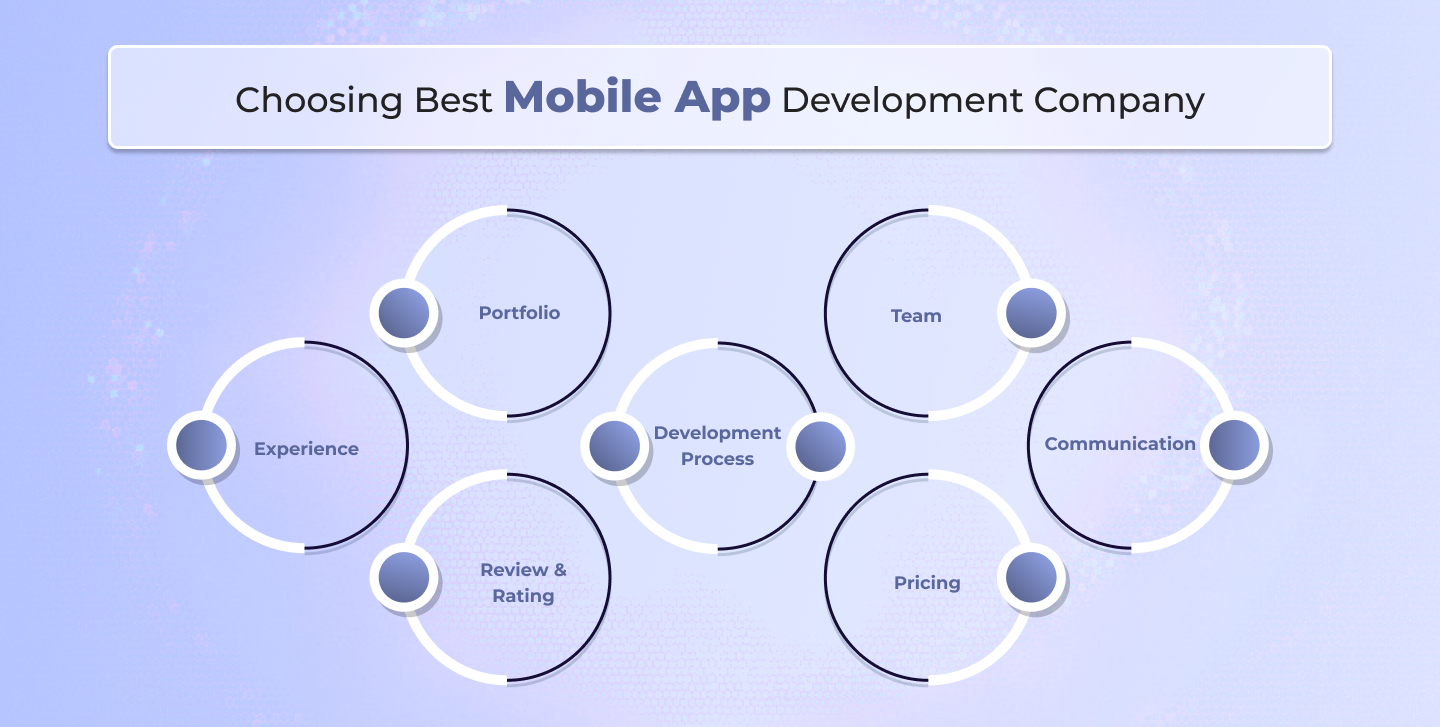
What Is The Primary Cost Of Mobile App Development In The USA?
Mobile app development has become a crucial aspect of modern businesses, providing a seamless and engaging experience to users. However, one of the most significant concerns businesses have when considering mobile app development is the cost. Here is the primary cost of mobile app development in the USA:
● Complexity of the App
It is one of the primary factors that determine the cost of mobile app development. The more complex the app, the more time and effort it takes to develop, resulting in higher costs. For example, a simple app that requires basic functionality like a calculator or a stopwatch will cost less than an app that requires complex functionality like artificial intelligence or machine learning.
Price point: The cost of developing a simple app can range from $5,000 to $20,000, while developing a complex app can range from $50,000 to $500,000.
● Design
App designing also affects the cost of development. A well-designed app with an intuitive user interface and high-quality graphics requires more time and effort to develop, leading to higher costs. Designers play a crucial role in developing a visually appealing and user-friendly app, so investing in a skilled and experienced design team is essential.
Price point: The cost of designing an app can range from $5,000 to $20,000.
● Development Platform
It is another significant factor in determining the cost of mobile app development. The two primary platforms for app development are iOS and Android, and each has its unique development requirements. Developing an app for both platforms requires more time and effort, leading to higher costs. It’s essential to consider which platform is best suited for your business needs and target audience and allocate resources accordingly.
Price point: The cost of developing an app for a single platform can range from $10,000 to $50,000, while developing an app for both platforms can range from $20,000 to $100,000.
● Features and Functionality
The features and functionality of the app also impact the cost of development. More complex and advanced features require more time and effort to develop, leading to higher costs. It’s essential to prioritize the app’s key features and functionality and allocate resources accordingly to ensure a successful project.
Price point: The cost of developing an app with basic features can range from $20,000 to $50,000, while developing an app with advanced features can range from $50,000 to $150,000.
● Testing and Maintenance
These are critical aspects of mobile app development and can impact the overall cost of the project. Proper testing and maintenance ensure that the app functions correctly and remains up-to-date with the latest operating systems and technologies. Neglecting these aspects can lead to additional costs down the line, so it’s essential to allocate resources for testing and maintenance.
Price point: The cost of testing and maintenance can range from $5,000 to $20,000 per year.
● Location of the Development Team
It is another factor that affects the cost of mobile app development. Developing an app in the USA is more expensive than outsourcing development to other countries like India or Ukraine. However, outsourcing comes with its unique challenges, such as language barriers and cultural differences. It’s essential to weigh the pros and cons of each option and choose the one that best suits your business needs and budget.
Price point: The cost of outsourcing app development can range from $15 to $150 per hour.
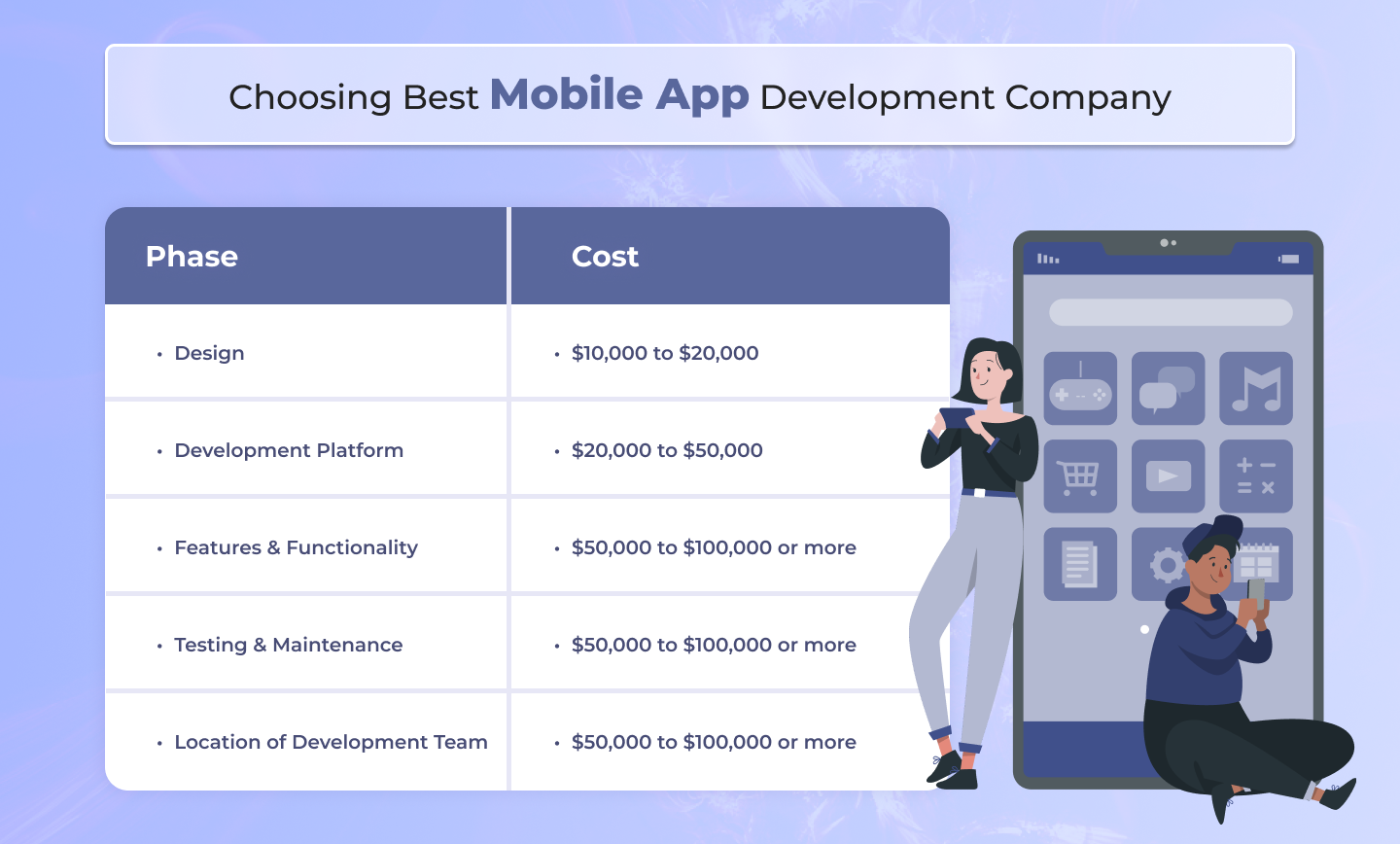
Final Words:
Mobile app development is an important aspect of modern business, and it’s essential to understand the primary cost factors involved. The complexity of the app, design, development platform, features and functionality, testing and maintenance, and location of the development team are the key factors that determine the cost of mobile app development in the USA. By carefully considering these factors and allocating resources accordingly, businesses can ensure a successful app development project within their budget. It’s important to remember that the cost of app development can vary significantly based on various factors, and it’s always best to consult with an experienced and reliable mobile app development company to get an accurate estimate.

TABLE OF CONTENT
- The Best Mobile App Development Company in the USA
- What Is A Mobile App?
- What Is Mobile App Development?
- What Are The Benefits Of Developing Mobile Apps?
- What Are The Types Of Mobile Apps?
- What Are The Basic Features Of Mobile Apps?
- How To Choose A Type Of Mobile App For Your Business?
- How To Choose The Best Mobile App Development Company In The USA?
- What Is The Primary Cost Of Mobile App Development In The USA?
- Final Words:

